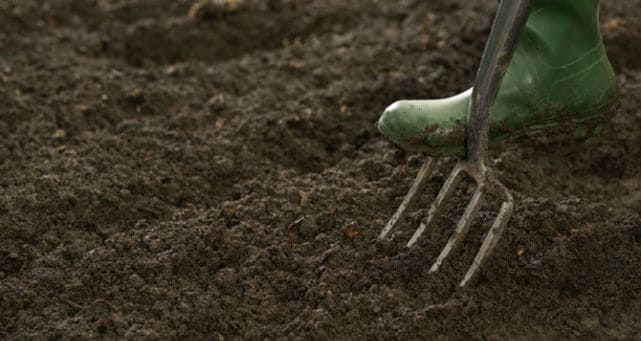Good news fellow green thumbers, it’s time to get your gardening tools and gloves ready for spring! As we slowly enter into April, the snow melts into the ground and the cold winters break into longer, warmer days; many of us become eager to start planting in our gardens but it is important to care for the soil at this stage by adding back important nutrients and improving texture so that healthy plants can flourish.
Here’s a checklist to get your soil preparation for gardens and lawns started:
1. When can we start digging? Check the soil conditions.
A mistake that many make is working on the soil too early. Allow the melting snow and spring rain to pass and the earth to dry out a bit before attempting to do any work. Heavy, wet soil is difficult to work with and doesn’t break up into loose, plant-friendly texture. Also, treading across wet ground will further compact the soil making it much more difficult to dig up later.
Is the soil dry enough? Do a quick test!
Squeeze a handful of soil and form a ball in your hands. If the lump of soil shatters easily when given a tap, it is ready! If the lump keeps its shape or breaks apart in solid sections, it still contains too much water and you must let it dry out some more. Clay soil, the type commonly found in Mississauga, when too wet will feel slick when rubbed between the fingers.
2. Clearing the area
Springtime is often associated with new birth and green growth, but as the white snow melts, we are often left with areas of debris, rocks and twigs. These need to be cleared away. A spade or a hoe is a handy tool to have.
3. Dig deep and loosen the soil
Don’t make the common mistake by using lousy soil. Plant roots grow below the ground so remember to dig deep! It is best to work soil 10 to 12 inches deep.
4. Adding organic matter
Lay the organic matter on top of the loosened, prepared soil and work the material thoroughly into the soil with a spade or a fork. Make sure it is even distributed. You can’t change the soil you have but adding organic matter drastically improves the overall soil quality.
Organic matter improves the soil by:
- It helps loosen and aerate clay soil
- It improves the water – and nutrient-holding capacity of sandy soil
Add lots of organic matter such as:
- compost
- manure
- peat moss
- grass clippings
- aged sawdust
Spring soil preparations maybe hard and tedious work but it can save you untold disappointments and ensure you give your new plants and seedlings the best nutritious soil to grow and thrive in.
For more free landscaping advice, please contact us and we will be more than happy to help you out.

